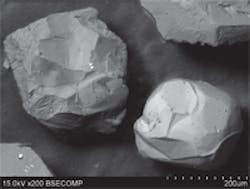Mineral Innovations for Challenging Times
Unimin Corp. anticipates metalcasters’ future mineral requirements through its fundamental research and application-based product development programs. Current initiatives reflect our customers’ commercial and compliance objectives, including projects designed to improve yield, reduce cost, minimize emissions and eliminate waste. As an active participant in the major industry groups, including the American Foundry Society, the Casting Industry Suppliers Association, Foundry Industry Recycling Starts Today (FIRST) and various State Cast Metals Associations, Unimin is proud to collaborate with other industry professionals to promote the advancement of the foundry industry. Our engineers serve on many technical committees and have authored technical documents that benefit the entire foundry industry. From laboratory innovation to casting floor implementation, foundries depend upon Unimin.
In North America, the MetalcasterSM line of foundry aggregates includes INCAST® silica core and molding sands and INCAST LE low-expansion olivine specialty sands. These sands continue to be the most thermally stable and efficient refractories for molten metal contact in green-sand and core-sand applications. In today’s business climate, the choice of sand type and its ultimate effect upon casting quality is not a casual decision. Properties of base aggregates and the proficiency of supplier technical support, can have a profound effect upon overall foundry production costs, minimization of material usage, and achievement of environmental standards.
Quality castings
INCAST low-expansion olivine foundry sand is relied upon to solve difficult casting and design challenges due to its unique combination of physical, chemical, and thermal properties. INCAST olivine produces highly refractive cores and molds that resist metal penetration and surface burn defects over the entire range of iron and steel alloy pouring temperatures.
With a sub-angular particle shape and engineered screen distributions, INCAST can be compacted into a stable, yet highly permeable, refractory mass that affords users the option of selecting finer sands to improve surface finish. INCAST’s low and uniform thermal expansion greatly reduces mold wall movement, centerline shrinkage, and surface defects to produce detailed near net shape castings.
Also, its high heat absorption properties promote the development of smooth-cast-surface aluminum castings by reducing the resonance time against the mold wall to produce a finer metallic grain structure.
INCAST’s basic chemistry promotes a quicker and more complete activation of Bentonite clay in green sand systems and also makes it a natural choice for the casting of Hadfield austenitic manganese steel. Olivine does not react with this basic alloy, and instead produces a chemically compatible and dimensionally stable mold wall in which scabbing and metal penetration defects are substantially reduced or totally eliminated.
Cost, quality innovations
Low Emissions: Inorganic Core Binder Systems — Resin-bonded cores and molds can also benefit from INCAST olivine chemistry. Basic or neutral resin systems such as sodium silicate, alkaline phenolic, phenolic urethane, and, for a cleaner workplace, the new class of water soluble, environmentally friendly inorganic binder systems are all compatible with INCAST. As foundries go green, INCAST can be part of the solution.
Cost Reduction: Chromite and Zircon Substitutions — INCAST’s high heat absorption and low thermal expansion properties also render it a solution for the chronic supply issues and cost escalation of chromite and zircon. Olivine blends with these specialty sands have maintained thermal performance and productivity at substantially reduced cost.
Quality and Productivity: Antiveining Additive — One of the most recent innovations by the Unimin technical support group with perhaps the most far reaching implication is the development of olivine anti-expansion additions to silica coremaking sands. This improves yield, reduce veining, lower cost and eliminate waste.
Dimensional Stability: Lost Foam Backing Media — When used as unbonded backing sand in the lost foam casting process, olivine's natural permeability prevents casting pyrolysis defects by allowing evolved pattern gasses to easily migrate through the mold coating and sand mass. In large gray and ductile iron work, INCAST’s higher density, combined with lower thermal expansion, produces a heavier backing sand mass that will remain dimensionally stable throughout the process.
